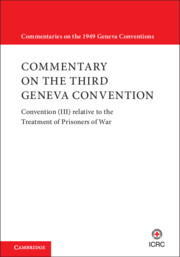 Commentary on the Third Geneva Convention
Commentary on the Third Geneva Convention Book contents
- Commentary on the Third Geneva Convention
- International Committee of the Red Cross
- Copyright page
- Contents
- Foreword by Peter Maurer
- Acknowledgements
- Abbreviations
- Introduction
- Preamble
- Part I General Provisions
- Article 1 Respect for the Convention
- Article 2 Application of the Convention
- Article 3 Conflicts not of an international character
- Article 4 Prisoners of war
- Article 5 Beginning and end of application
- Article 6 Special agreements
- Article 7 Non-Renunciation of Rights
- Article 8 Protecting Powers
- Article 9 Activities of the ICRC and Other Impartial Humanitarian Organizations
- Article 10 Substitutes for Protecting Powers
- Article 11 Conciliation Procedure
- Part II General Protection of Prisoners of War
- Part III Captivity
- Part IV Termination of Captivity
- Part V Information Bureaux and Relief Societies for Prisoners of War
- Part VI Execution of the Convention
- Book part
- Sources
- Index
- References
Article 9 - Activities of the ICRC and Other Impartial HumanitarianOrganizations
from Part I - General Provisions
Published online by Cambridge University Press: 21 August 2021
- Commentary on the Third Geneva Convention
- International Committee of the Red Cross
- Copyright page
- Contents
- Foreword by Peter Maurer
- Acknowledgements
- Abbreviations
- Introduction
- Preamble
- Part I General Provisions
- Article 1 Respect for the Convention
- Article 2 Application of the Convention
- Article 3 Conflicts not of an international character
- Article 4 Prisoners of war
- Article 5 Beginning and end of application
- Article 6 Special agreements
- Article 7 Non-Renunciation of Rights
- Article 8 Protecting Powers
- Article 9 Activities of the ICRC and Other Impartial Humanitarian Organizations
- Article 10 Substitutes for Protecting Powers
- Article 11 Conciliation Procedure
- Part II General Protection of Prisoners of War
- Part III Captivity
- Part IV Termination of Captivity
- Part V Information Bureaux and Relief Societies for Prisoners of War
- Part VI Execution of the Convention
- Book part
- Sources
- Index
- References
Summary
Article 9 grants impartial humanitarian organizations the right to offer, tothe Parties to an international armed conflict, to undertake humanitarianactivities. The International Committee of the Red Cross (ICRC) is explicitlymentioned as an example of an entity entitled to rely on this provision.Humanitarian activities can take the form of relief or protection.
- Type
- Chapter
- Information
- Commentary on the Third Geneva ConventionConvention (III) relative to the Treatment of Prisoners of War, pp. 477 - 501Publisher: Cambridge University PressPrint publication year: 2021


